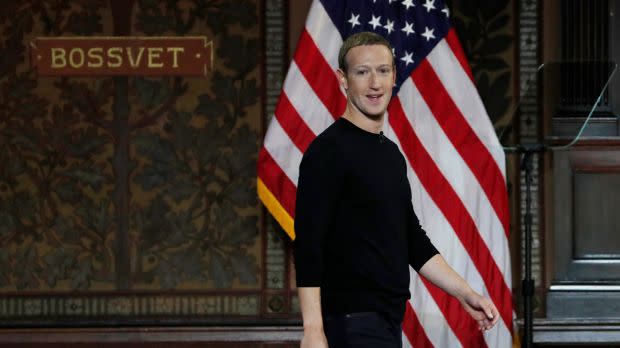Can the UK really force Facebook to sell Giphy?

The UK’s antitrust regulator ruled on Nov. 30 that Meta Platforms, Facebook’s parent company, must sell Giphy, a GIF database and search engine it purchased for $315 million in 2020. The Competition and Markets Authority (CMA) said that the acquisition could harm British social media users and advertisers.
The CMA found that Meta’s control of Giphy could negatively affect competitors like TikTok, Twitter, and Snapchat if Meta denied them access or required more data from competitors. It also determined that, since Giphy was an up-and-coming advertising platform, Meta bought a potential rival in a market it already dominates. According to the CMA, British social media users spend 73% of all minutes on social media on Meta’s apps—Facebook, Instagram, and WhatsApp—and the company controls 50% of the $7.3 billion display advertising market in the UK.
Meta said it disagrees with the decision and is considering an appeal. “Both consumers and GIPHY are better off with the support of our infrastructure, talent, and resources,” a company spokesperson said.
The CMA’s decision marks the first time the British government has forced a major American technology company to divest one of its major acquisitions. The era when companies like Facebook (or Meta) could snap up potential competitors at will appears to be coming to a close. Regulators are beginning to apply a new anti-trust standard when scrutinizing mergers that threaten to entrench the market power of dominant tech firms.
The UK vs. Facebook
Europe, the world’s largest common market, has been flexing its regulatory muscle over US tech giants in recent years. CMA’s recent order marks an unprecedented escalation of oversight over America’s tech giants. While Meta and Giphy are both US companies, the British government has the power to block or unwind mergers on antitrust grounds, says Daniel Crane, a professor at the University of Michigan Law School, who specializes in antitrust law. “If Facebook and Giphy both participate in the UK market,” he says, “the CMA has jurisdiction over them and can, in principle, order Giphy divested.”
This cross-border oversight is necessary for examining global companies, especially ones that serve the online world, says Michelle Meagher, a co-founder of the antimonopoly-focused Balanced Economy Project, who has worked for both UK and US antitrust regulators. “This ability to review deals happening elsewhere in the world is an essential part of the global competition enforcement regime,” she said.
It’s rare that the CMA forces the divestiture of two companies based outside of the UK. But it’s not unprecedented. In 2020, the US Justice Department tried and failed to block the merger of two US software companies, Sabre and Farelogix, but the CMA blocked the merger (pdf) just two days later.
Giphy’s merger with Meta evaded US scrutiny through some accounting sleight of hand that lowered its official value, according to Bloomberg. Giphy reportedly paid a dividend to investors ahead of its deal with Facebook to lower the value of its assets, ducking under a federal threshold for reporting the merger to the US Federal Trade Commission (FTC). After this incident, the FTC reportedly changed its guidance for reviewing mergers, but the CMA stepped in before US regulators took action.
Antitrust regulators are changing their tune
The CMA’s case against the Meta and Giphy merger largely relies on the assumption that Giphy could have built a digital advertising business that would have competed with that of Meta.
In fact, that is precisely what happened when Facebook acquired Instagram for $1 billion in 2012. At the time, the UK’s Office of Fair Trading, then the consumer protection authority in the country, said that Facebook and Instagram did not post anti-trust concerns because Instagram earned no advertising revenue, and other competitors existed in the mobile camera space such as Camera Awesome, Hipstamatic, and Camera+. But Instagram’s rapid growth, combined with Facebook’s reach, technology, and ad sales savvy, meant that it soon pushed out other players.
The appetite for regulation is now much higher on both sides of the Atlantic. Facebook has been sued by the FTC and 48 state attorneys general for allegedly buying companies to suppress competition in the social media market. Additionally, big tech companies have become a favorite target on Capitol Hill where they were the subject of a damning 451-page report (pdf) from the US House antitrust subcommittee. US president Joe Biden nominated Lina Khan, who has criticized the tech industry as monopolistic, to lead the FTC.
But the recent CMA decision to unwind the Meta-Giphy acquisition was a particularly aggressive maneuver, says Benjamin Sirota, a former Justice Department antitrust prosecutor and an attorney at the law firm Kobre & Kim. Since the two firms don’t necessarily overlap in function and have weak ties to the British market, the decision points to greater willingness of antitrust regulators to intervene proactively when there is the potential for abuse. It also spells trouble for Facebook and the largest tech companies if they try to make deals. “My first thought was: Is there going to be any deal in this climate when Facebook is not going to be challenged?” said Sirota.
Sign up for the Quartz Daily Brief, our free daily newsletter with the world’s most important and interesting news.
More stories from Quartz:
India’s omicron cases show the variant was global even before the travel bans kicked in
The US Supreme Court is considering the economic impact of abortion
